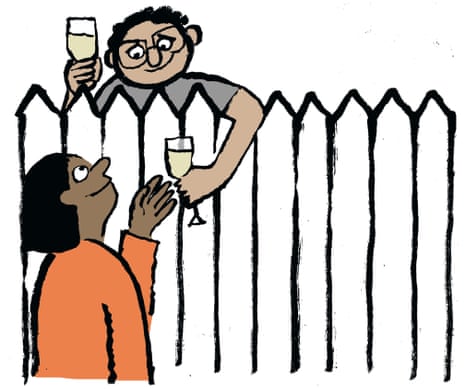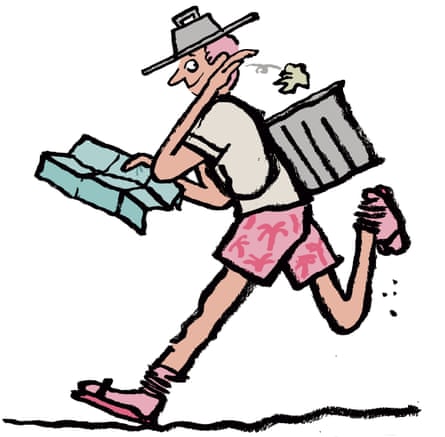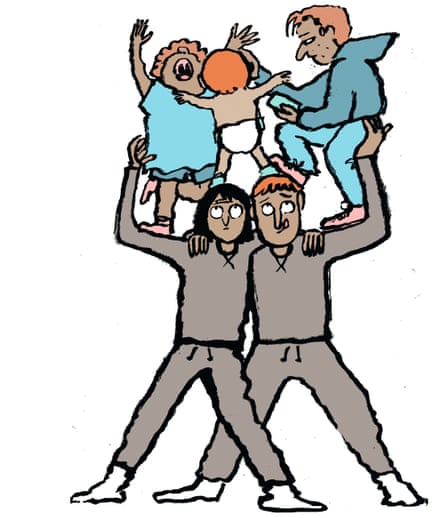How can you be the best possible parent, lover, friend, citizen or tourist? Here’s what the experts think
It’s not easy being a ‘good’ person – what can we learn from the people who have thought about it the most?

I used to think I was a good person. I was caring to my friends, my partner, my family; I gave to charity and I volunteered; I wasn’t racist, homophobic or sexist. Boxes: ticked. But when I started training to become a therapist in the NHS, I began to understand that however much we might like to think of ourselves as good people, we don’t actually know ourselves very well. We don’t know what’s really going on under the surface; why we do the things we do.
I learned about how we might, without consciously realising it, deny the feelings and motivations we consider to be bad, pushing them down into our unconscious and projecting them out on to others, so they become the bad people. I learned that deep in the human psyche, alongside love and kindness, run currents of rage, need, greed, envy, destructiveness, superiority – whether we want to acknowledge them or not. Goodness me, I thought. How terrible – for everybody else.
But of course, it is not just true for everybody else. As a patient in psychoanalysis, I’ve now discovered all this so-called badness exists in me, too. Unconsciously, perhaps I had tried to cancel out these judged-as-bad thoughts and feelings by doing good and helping others. Now I see that as hypocrisy and avoidance. Real goodness grows from accepting that the capacity for badness we abhor in others and in our institutions also exists within ourselves. If we can tolerate and understand this, then we can see and repair the damage we inevitably do to our loved ones and others. This is how we can grow into better adults, partners, parents, neighbours, citizens, travellers, friends. I asked experts in “goodness” what it meant to them. Here’s what they told me.
How to be … a good citizen
Matthew Bolton, executive director of Citizens UK and author of How to Resist: Turn Protest to Power
Sometimes we mistake being a good citizen with fulfilling our role in our representative democracy. We have the privilege of being able to vote, an amazing thing that people across the world would wish for, and that people in our own history here have fought for – but the work of being a good citizen is about democratic activity day in, day out, in your neighbourhood, at your work, around any cause that matters to you.
The first step is to spend time reflecting on what you really care about – something deeply connected to you. Being a good citizen and making a difference is hard and takes time, so choose something you’ll still care about in 2024 and beyond. Is there no safe green space in your neighbourhood? Do you want to fight the climate crisis? Is there a dangerous road crossing near your house?
The next step is to recognise that you can’t be a good citizen on your own. Research who is already campaigning and connect with others. Relationships will sustain you and your motivation. Being a good citizen isn’t just about joining one protest; that can leave you jaded and hopeless when things don’t change. It’s about making connections and staying the course.
Finally, think local. Focusing on parliament can feel disempowering – it can contribute to the feeling that nothing ever changes. But I’ve seen big changes come from local people coming together to make small shifts that spread from neighbourhood to neighbourhood and end up influencing government policy. That’s what is happening with Citizens UK’s campaign for the living wage. I believe that citizens are made, not born. You can learn to be a good citizen – and it’s never too late to start.
… a good partner and lover
Couples therapist Catriona Wrottesley
In couples therapy, you often see partners who have a sort of belief system they aren’t aware of – that one is the caring parent and the other is the cared-for child. When you question it, they look at you as if you’re crazy: “Of course we care, that’s what a good partner does!” But in this particular couple system, care is modelled on the mother-infant relationship (although either gender can be in either role), where one person is always in emotional turmoil and the other makes it better, rather than two adults offering each other reciprocal care. You might think you’re being a “good partner”, but this fixed dynamic can drain relationships of life and spontaneity – not to mention sex.
Similarly, one partner might see themselves as “good” at doing chores around the home or comforting the children, and become impatient and frustrated with the other who becomes the “bad” one. And the more you’re deprived of the opportunity to clean a bathroom or hold a crying baby – even if it’s not exactly how the primary carer might do it – the less confident and more inadequate you might feel, and the more these roles can become entrenched.
All of this can make for a pressurising atmosphere in the bedroom. Men often speak about feeling they have to perform – but when you talk about performance, you lose touch with yourself and your partner; you’re relating to some external standard that takes you outside your relationship. If you can be less goal-oriented in your lovemaking, you might begin to enjoy all the aspects of being intimate. You can have an experience that’s not all about you and your partner having mind-blowing orgasms, but about being together in a total sense, seeing each other in the most intimate way – being vulnerable and playful because you feel safe and happy. That’s not focused on the goal of having great sex, but great sex may well be the outcome.
… a good tourist
Juliet Kinsman, co-presenter of Funny Old World: a Podcast for the Eco-Curious

Being a good tourist means treating somebody else’s home with respect, leaving little in your wake and putting as much money as possible in local pockets.
People tend to think about sustainable, responsible travel only as environmentally friendly travel – and, of course, we should support businesses that are kinder to nature. But the economic power of travel is immense, and you control that wealth distribution. Pick accommodation with local owners; they’re more likely to be a better custodian and employ local people. You don’t want to stay in a hotel that exists to make money for an international management company; ideally you’d book a small independent guesthouse directly. If not, tour operators such as Intrepid or Responsible Travel are sticklers for supporting local businesses.
I always advocate for undertourism. Choose destinations that get fewer travellers rather than more obvious, overpopulated places. The pandemic turned everything upside down, so some countries that were previously victims of overtourism now desperately need our money, such as Peru. But instead of Machu Picchu, why not visit Kuélap, an Inca site in the north that’s older and less well known? Also consider which countries operate on better renewable energy grids: Norway, Spain and Costa Rica run on high amounts of renewable energy, whereas the Dominican Republic and many other tropical islands run on diesel generators.
How will you get there? I love Byway, the slow travel, flight-free itinerary booker that takes away the faff of deciphering train timetables. If you are going to fly, remember a low-cost airline packed full has a much smaller carbon footprint per person than an expensive flight with a lot of business-class seats.
But this is also a question of basic manners. Being a good traveller means not being entitled, not demanding the best table in the restaurant because we can’t all have that. And be patient: there’s a global crisis in employment in hospitality and service isn’t as good as it used to be, so we all need to be more tolerant.
READ RELATED: Can I ever heal after the lack of love my birth mother showed me? | Ask Annalisa Barbieri
… a good neighbour
Hafeezah Soni, Yorkshire programme manager for the Jo Cox Foundation
Being a good neighbour isn’t about organising street parties twice a year. That’s setting the bar too high, and not everyone will have the time or the social or mental resources to take part in group activities. But if you know your neighbour celebrates Diwali, why not drop them a note to wish them well? It doesn’t cost anything, but it makes people feel valuable, seen and respected.
In my work, I hear a lot about belonging, social cohesion and loneliness, and many people tell me they don’t feel as if they belong, whether that’s because of language difficulties, accessibility problems, or different opinions. These problems may seem huge, but I’ve found that communities can change through very small gestures – micro-interactions, such as smiling, saying hello, thanking the bus driver. Research shows us that this can improve wellbeing and reduce loneliness.
It’s not always easy to be a good neighbour. When there are difficulties, you can only try to understand the other person’s perspective and find some common ground. If you smile at someone and they don’t smile back, well, that’s OK; they may have something going on that you don’t know about. Good neighbours create an environment where a smile and a hello is possible, whether or not the other person is able to accept it.
You don’t need to be your neighbour’s best friend. I live near lots of elderly people and I see their routines, so if I don’t see a light come on I can wonder what may be wrong. An acquaintance has value for being just that, because a sense of community fosters a feeling that help is available for those who need it, while respecting everybody’s boundaries. Knowing a neighbour is there for you in difficult times can be powerful. During the pandemic, we saw a rise in local Facebook and WhatsApp groups, people leaving food on doorsteps – we learned the value of good neighbours, and we mustn’t forget it.
… a good parent
Josh Cohen, psychoanalyst, “good enough” parent and author of How to Live. What to Do. How Great Novels Help Us Change

The entire parenting industry claims to know the answer to this, feeding the fantasy that you can get parenting right. These gurus insist they alone know what is good, and that any alternative approach is bad for your child. Possibilities and anxieties proliferate.
The popularity of attachment parenting has spread the idea that maintaining a perpetual bond between mother and child is the way to avoid the trauma of separation. That this is what it means to be a good parent. But growth itself is traumatic. Development involves becoming a separate person, and that’s traumatic: anyone who claims you can short-circuit that is a glorified snake oil salesman.
The psychoanalyst Donald Winnicott is perhaps most famous for his concept of “good enough” parenting – the antithesis of this industry that offers only perfect solutions, set up to make parents feel inadequate if they don’t work, in which we always fall short of a punishing ideal. But if you start from the perspective that there is no ideal – not only that you might make mistakes but you will and you have to make mistakes – it can be a kind of liberation. There is something monstrous about the very notion of error-less parenting; it would mean being an AI bot who knows all the right moves but can’t transmit its own humanity because it doesn’t have any. And one of the jobs of a good enough parent is to transmit humanity, fallibility, tolerance of imperfection.
Likewise, being a “good” parent does not mean raising a “good” child. If you try to make your child “good”, they will become a distorted reflection of your own mind. Whereas if you can create an environment and a dynamic in which your child is encouraged to think for and about themselves, to be in touch with so-called negative emotions such as sadness and anger, they can become their own person. That doesn’t mean you surrender your authority; it means you model a different kind of authority. All of this happens naturally when you try to find ways of talking to your child about what they are thinking and feeling; listening, being curious and orienting yourself towards them in a receptive rather than an imposing way. Children can become incredibly anxious when they believe that there is a right and good answer and a right and good way of doing things that they may not be successfully achieving. And so can parents.
… a good friend
Clinical psychologist and friendship researcher Miriam Kirmayer
Some characteristics of a good friend may seem fairly obvious: we think of them as someone you can trust, who is reliable, supportive and present. In fact, there’s a common belief that being a good friend means needing to be consistently willing to give that support, presence, energy. But if we are constantly in that giver role, depleting ourselves by supporting others without taking the opportunity to be supported by them, that can be a recipe for burnout, resentment and feelings of distance and disconnection. You may sense that your friends don’t really understand you, don’t know what’s going on with you – and they may feel the same.
The other side of that, which often gets missed, is that it feels good for our friends to show up for us when we’re struggling. When we aren’t comfortable being vulnerable with our friends and leaning on them, we are robbing them of that chance to support us, to feel that they are a good and valued friend to us. So as well as asking, “How can I be a good friend to you?”, we need to ask, “How am I allowing you to be a good friend to me?” Are you allowing friends to show up for you, and what boundaries do you need to set to contribute to that? Sometimes it’s a question of opening up more, or it might be a case of needing to pull back and not being so giving.
We might feel we are responsible for fixing our friends’ problems and removing their pain, but often what they need is for somebody just to be there with them. Sitting with someone in their distress, letting them know that when they feel overwhelmed or anxious or down, we can tolerate that, and we aren’t going anywhere – and letting them do the same for us – can be a powerful step towards being a better friend.
… a good grownup
Moya Sarner, NHS psychodynamic psychotherapist and author of When I Grow Up – Conversations With Adults in Search of Adulthood
It was 22-year-old Boru who taught me what it really means to be a good grownup. We first spoke four years ago for this newspaper, about his experiences as an 18-year-old with drug-induced psychosis treated on an adult mental health ward. When we spoke again in his early 20s, he told me he was using drugs to run away from his problems. He was unemployed, living with his parents, watching his friends’ lives progress. A good grownup, he told me, is “someone who’s got their shit sorted” – and that wasn’t him.
I also didn’t feel like the competent, confident grownup I thought I should be – and neither did most of the adults I knew. So I spent three years interviewing people aged 19 to 90, from all walks of life, about feeling not-quite-adult, as well as researchers in neuroscience, sociology, history and more for a book about adults and their search for adulthood.
I researched statistics about people hitting the traditional landmarks of adulthood later and later, if at all – from buying a home to getting married or starting a family. I recognised what made me feel like a bad grownup: that I’ll sit with a broken fridge rather than call an engineer to repair it. And I reflected that surely these cannot be the most meaningful markers of adulthood. Being a good grownup runs deeper than that.
Then I saw Boru again. He told me how, over two years, he’d quit drugs, found a job he loves, rented a flat with a friend. He’s now cycling round the world, having adventures that will nourish him for the rest of his life. So what changed? He says he started to grow up because he stopped running away. That meant listening to his thoughts and feelings, including the ones he didn’t like, grappling with his situation, working things through. “You start to have those conversations with yourself, and you become more of an honest person. I don’t feel like I’m hiding from anything any more, because I’m not hiding from myself.”
I think growing up must involve finding your own way to have those conversations. Boru does it on his bike, I do it in psychoanalysis, others I spoke to do it while cooking or playing music. That, for Boru, and for me, is what it means to get your shit sorted.
Source: Health & wellbeing | The Guardian



